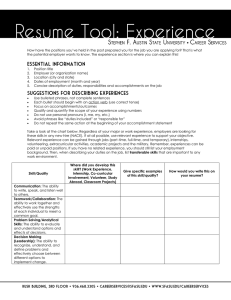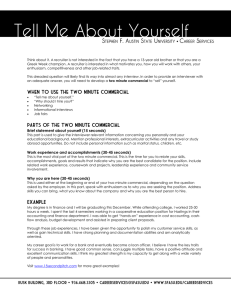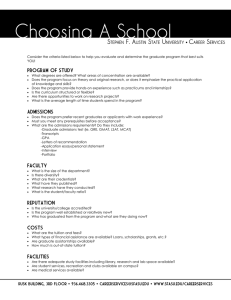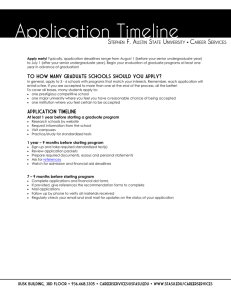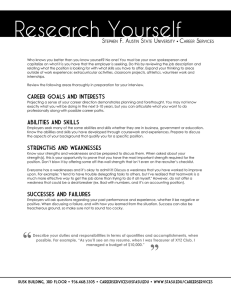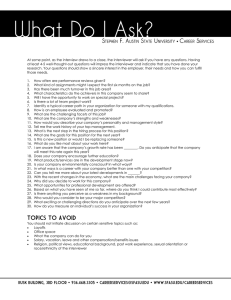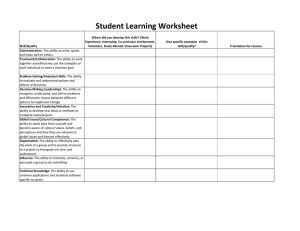Document 10428403
advertisement
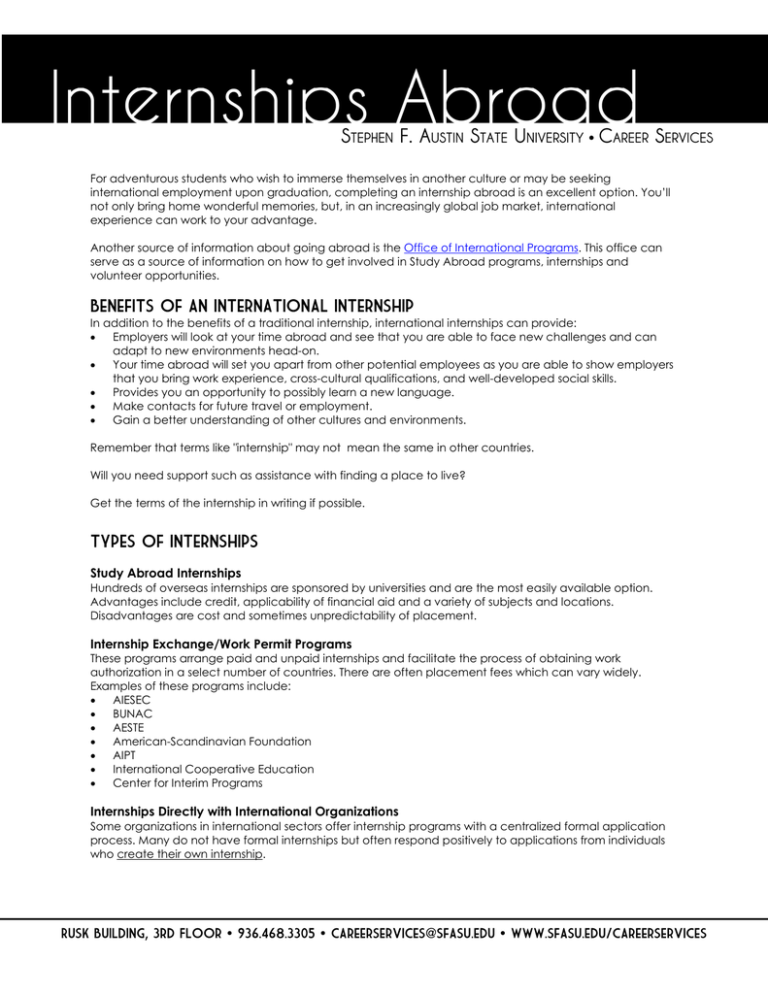
For adventurous students who wish to immerse themselves in another culture or may be seeking international employment upon graduation, completing an internship abroad is an excellent option. You’ll not only bring home wonderful memories, but, in an increasingly global job market, international experience can work to your advantage. Another source of information about going abroad is the Office of International Programs. This office can serve as a source of information on how to get involved in Study Abroad programs, internships and volunteer opportunities. Benefits of an International Internship In addition to the benefits of a traditional internship, international internships can provide: Employers will look at your time abroad and see that you are able to face new challenges and can adapt to new environments head-on. Your time abroad will set you apart from other potential employees as you are able to show employers that you bring work experience, cross-cultural qualifications, and well-developed social skills. Provides you an opportunity to possibly learn a new language. Make contacts for future travel or employment. Gain a better understanding of other cultures and environments. Remember that terms like "internship" may not mean the same in other countries. Will you need support such as assistance with finding a place to live? Get the terms of the internship in writing if possible. Types of Internships Study Abroad Internships Hundreds of overseas internships are sponsored by universities and are the most easily available option. Advantages include credit, applicability of financial aid and a variety of subjects and locations. Disadvantages are cost and sometimes unpredictability of placement. Internship Exchange/Work Permit Programs These programs arrange paid and unpaid internships and facilitate the process of obtaining work authorization in a select number of countries. There are often placement fees which can vary widely. Examples of these programs include: AIESEC BUNAC AESTE American-Scandinavian Foundation AIPT International Cooperative Education Center for Interim Programs Internships Directly with International Organizations Some organizations in international sectors offer internship programs with a centralized formal application process. Many do not have formal internships but often respond positively to applications from individuals who create their own internship. Rusk Building, 3rd Floor 936.468.3305 careerservices@sfasu.edu www.sfasu.edu/careerservices Volunteer Programs These programs arrange volunteer experiences in a range of areas such as education, health, community development, and environment. Some of these programs have placement fees, while others serve as a clearinghouse for opportunities. Paperwork Among the challenges of interning abroad are arranging passports, visas and a variety of other paperwork that may be required for work authorization. The processes for arranging the necessary paperwork can be time consuming, so make sure to start early. Passport One of the first things you will want to do is make sure you have a current passport. If your passport has expired, or if you don't have one, find out how to apply for one at the State Department's website. If you have a passport, check the date of issuance to make sure it won't expire before you return. Visa Certain countries require a visa, a document which gives someone permission to travel into a specific country and stay there for a set period of time. The visa is generally stamped on your passport, and is wise to obtain it before you leave the US. If you wish to earn money during your time abroad, or plan on staying longer than three months, a visa may be necessary. If you have secured a position in a country not represented by one of these organizations, you should contact the company that has made you an offer, as well as that nation's embassy. Working Papers Most countries require a work permit for full-time and permanent jobs. It is difficult to obtain a work permit in another country and the requirements vary from country to country. An employer has to prove that the foreign worker is uniquely qualified and a national candidate is not available. Find out the working visa requirements for your country of choice. However, more than likely your employer will handle the details. Check out these links for more information about obtaining working papers: BUNAC Going Global Workpermit.com You’ve Obtained an International Internship... Now what?! Cultural and Linguistic Preparation If you're going to a country where a foreign language is spoken, practice speaking that language in every way possible. Start by taking classes, joining conversation groups, or finding a language partner to practice with. Also, brush up on specialized vocabulary and keep a notebook of terms you may need. Also, become familiar with holiday customs, the main religion(s), weather, food, social etiquette, work ethic, concept of self and others, facial expressions and gestures. Health Concerns Two health issues are important: immunizations and insurance. The Center for Disease Control and Prevention runs an excellent website on Traveler's Health. You can find out about any health concerns related to the area you will be traveling to, as well as the required immunizations. Make sure your medical and accident insurance are valid in the country in which you travel. Budget Concerns Rusk Building, 3rd Floor 936.468.3305 careerservices@sfasu.edu www.sfasu.edu/careerservices It's important to consider the financial ramifications of your decision. Do a budget analysis. Make sure you have enough money to survive at least two weeks before finding paid employment. If you have student loans, talk to your parents about their expectations regarding repayment. Make sure you can afford the flight home. TIP: If money is tight, consider locations where the exchange rate is more advantageous. For example, consider Central or Latin America versus Spain, which is on the Euro. Housing Many study abroad programs will give you the option of living in a dormitory on a campus abroad or living with a host family (also called a homestay). Since hotels are generally too expensive for an extended stay, consider a youth hostel which offers a basic living environment at a good price. You can always use a hostel as a temporary place to stay while you find more permanent housing. Travel Warnings According to the US Department of State, travel warnings are issued when long-term, protracted conditions that make a country dangerous or unstable lead the State Department to recommend that Americans avoid or consider the risk of travel to that country. Check the US Department of State website before selecting and throughout your internship. Rusk Building, 3rd Floor 936.468.3305 careerservices@sfasu.edu www.sfasu.edu/careerservices
